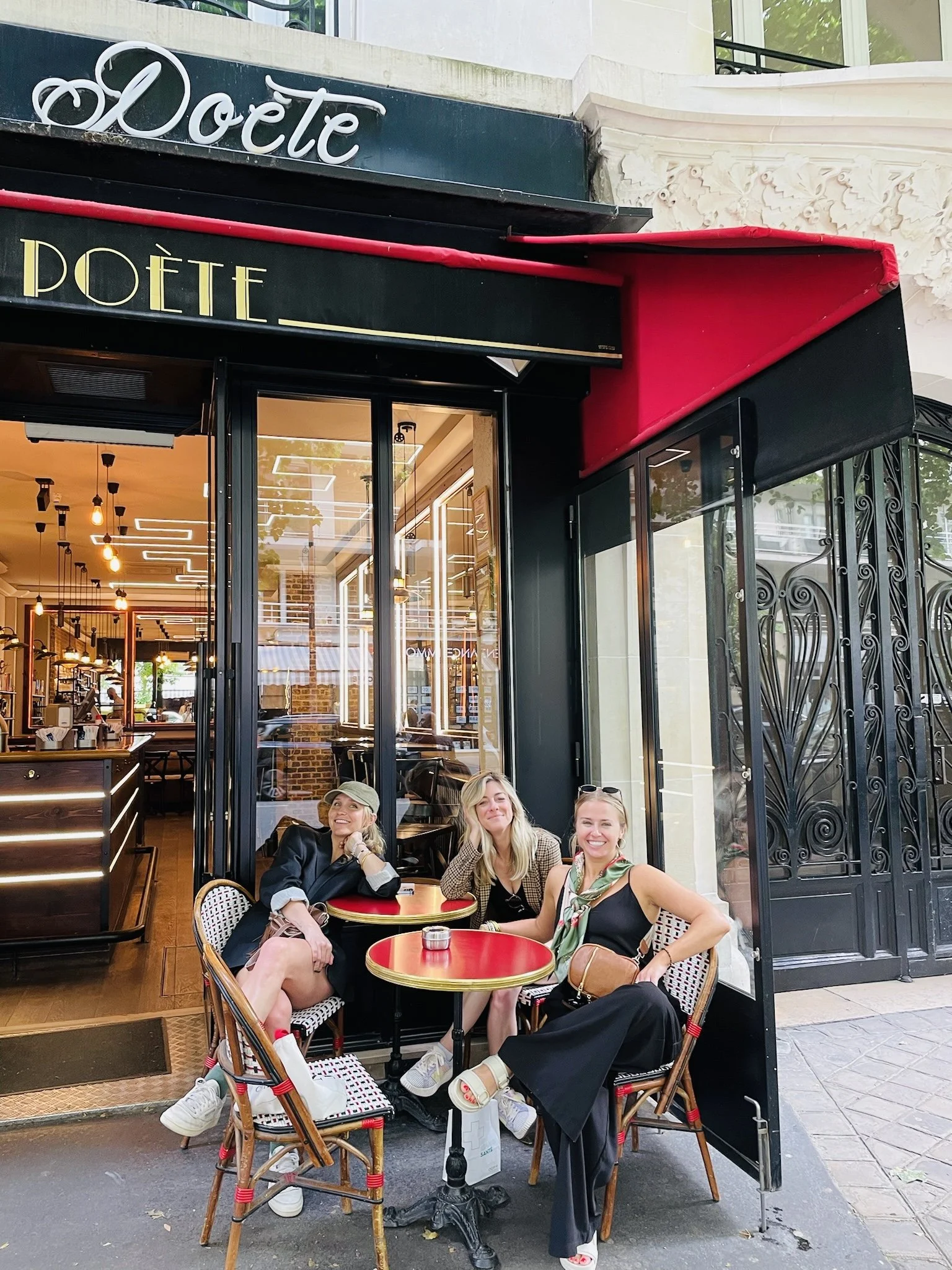Continue Reading
Biggest Finance Newsletter for Women
Join 200,000 other people interested in money, power, culture, and class.
Subscribe

Where we spent the vast majority of our trip—on patios.
I couldn’t resist naming this essay “Local Woman Discovers Leisure in European City,” as I recently learned all the cliches about life in Paris (and my reactions to them, as a former girl from the Kentucky suburbs) are deserved.
Yes, the food tastes better, and somehow even a straight pastry-and-cheese diet didn’t make me feel like a walking GMO. Yes, people really do rip cigarettes and espresso on patios at all hours of the day and all days of the week, and they’re doing it for pleasure, not to fire up the cylinders for a cubicle marathon.
Walking through Paris felt like sliding into a different time register. We slept until 10, drank coffee with dinner, and floated down wide, cobblestone streets, earning side eyes and open jeering from French people who didn’t find our tacky, American joy very palatable (the sequins and glitter probably didn’t help). I embraced the sort of vacation mentality that only feels possible in Europe, where it somehow always feels like everyone else is kind of on vacation, too.

Completing the European Eras Tour pilgrimage.
I allowed these indulgences while maintaining an acute awareness of the fact that it was precisely the opposite behavior—going to bed by 10, sitting at a desk all day, keeping a firm grip on everything around me—that enabled me to take such a trip in the first place; that is, without going into debt or financially compromising Future Me. This is a weird conflict with implications I’m still untangling.
It made me wonder who I might have become had I grown up attuned to that frequency, and not the frenetic, achievement-oriented one that begins plotting college admissions in kindergarten and making five-year plans for slotting childbirth into a ruthless ladder ascension.
I came back to the US on a high after spending 72 hours with my closest friends: women who are vibrant, sharp, and magnetic, each leading a full, meaningful life. It’s probably safe to say I’m the most one-dimensionally work- and money-obsessed in the bunch, and being around them reminded me of the importance of things like hobbies, slowing down, and—dare I say—just messing around.
During my 24-hour trek back to California, my feeds became saturated with clips from a commencement speech at Benedictine College that was going viral. In it, a man younger than I am extolled the virtues of traditional femininity (among other things) to an unsuspecting crowd of 22-year-olds. The speech had only been delivered 48 hours prior, but already an ample discourse had begun.
He addressed the “ladies” in the room—on the day of their college graduation—and said he’d “venture to guess” that while “some” of them “may” go on to have careers, “the majority” are probably “most excited” about their marriages and future children. (Effectively no modern political issue, no matter how seemingly irrelevant to the circumstances, made it through the 20-minute tirade unscathed.)
He was duly roasted. But predictably, the same old back-and-forth took shape in comment sections with people shouting past one another. “Nowhere did he say women couldn’t have both,” one person commented, “Women can have it all, family and career.” “Right,” another fired back, “He just said that a woman’s life doesn’t begin until she accepts her role as a wife and mother.”
On its face, splitting hairs over the rhetoric of a 28-year-old man who gets paid $4 million per year to kick balls for a living is absurd. We all know being a homemaker is a legitimate job that some people find very fulfilling; we all know it’s ridiculous to suggest it’s inherently the most fulfilling occupation every woman could aspire to (the nuns at Benedictine agreed, disavowing his statements afterward), and more ridiculous still to accept a young man as a credible source on women’s path to contentment. Frustrated by the familiar dialogue, I ended up channeling my feelings via a reprisal of a Taylor Swift song. It’s Female Rage: The Musical.
This schism is familiar: Pitting stay-at-home moms against women who want careers. The tradwives vs. the girlbosses in a pay-per-view cagematch, caricatures of feminine nurturing and ambition. Traditionally (and by traditionally, I mean, the 1980s), “having it all” meant a family and a career—but only for women, obviously, since a man with a family and a career is…just a man.
The promise coming from the tradwife corner is that ambition is a trap and one should retreat into the supposedly more “natural” soft life of the family instead, presuming these are the only two spheres in which a woman can find meaning.
As such, a common retort when a woman expresses a desire to remain single or childfree goes something like this: Your career won’t love you back (the implication being, of course, that children are like Tamagotchis, and if you birth, feed, and bathe one, the return on emotional investment is all but guaranteed).
Following my weekend in Paris with my three best friends (all of whom are unmarried Gen Z/millennial cuspers), I was struck by the utter lack of this binary. If my friends are any indication, this generation’s definition of a full life extends far beyond both the grinding hustle of unchecked careerist ambition and the often thankless domestic labor that accompanies motherhood in a world where women statistically bear a disproportionate amount of the work. (It would appear US birth rates are at an all-time low, so maybe this observation goes beyond the anecdotal.)

A full life might mean forgoing the benefits and drawbacks of focusing too intensely on either, at least for a while. We stayed up late at cafés talking about the Parisian open mic nights where my friend performed before the rest of us arrived; about another friend’s recent art exhibit at a gallery and her backcountry skiing hobby. The other guided me through breathwork and gave me tips on raising my chronically low HRV, something she knows a lot about after years of independently studying and practicing meditation. We talked about the best books we’d read recently, regaled one another with lawless college stories, and debated the practicality of wearing silk scarves unironically back on our home continent (jury’s still out).
What was notably absent from these discussions: talks of romantic partners, any whisper of eventual children, or serious career considerations. My friends date and enjoy their jobs to varying degrees, but much like their French counterparts, they work to live, not live to work.
I want more of this, I decided from the bubble of our easy togetherness, admiring the full, well-rounded lives my friends have created. This thought was followed swiftly by an uncomfortable realization: the lifestyle that enabled these sumptuous conditions on my behalf was the antithesis of them.
Some of this is undoubtedly the natural delusion we all feel on vacations (“I’m going to move here!”), but there’s a larger, structural dynamic at play. As our personal lives and preferences evolve, it almost definitionally upends the structure of our financial lives, too. Whether that’s because you decide to become a parent, change careers, or simply pour more of your limited time and energy into enjoying your life. Priorities are not static.
So maybe the centrality of the traditional “having it all” narrative in the conversation about women’s lives has outlived its usefulness. It hardly feels capable of illustrating the multitudes that my friends’ lives contain: passion, art, music, emotional regulation, self-inquiry, leisure, curiosity, adventure, and untold other endeavors that have nothing to do with their relationship to anyone else, be it spouse, boss, or offspring.
We play an important role in one another’s lives, too. It’s strange how the fierce bonds of female friendship never seem to enter the equation when women are lectured about how their careers will never love them back.

May 20, 2024
Looking for something?
Search all how-to, essays, and podcast episodes.
Explore
While I love diving into investing- and tax law-related data, I am not a financial professional. This is not financial advice, investing advice, or tax advice. The information on this website is for informational and recreational purposes only. Investment products discussed (ETFs, index funds, etc.) are for illustrative purposes only. It is not a recommendation to buy, sell, or otherwise transact in any of the products mentioned. Do your own due diligence. Past performance does not guarantee future returns.
Money with Katie, LLC.
Terms & Conditions | Privacy Policy
This Site Was Built by Brand Good Time



